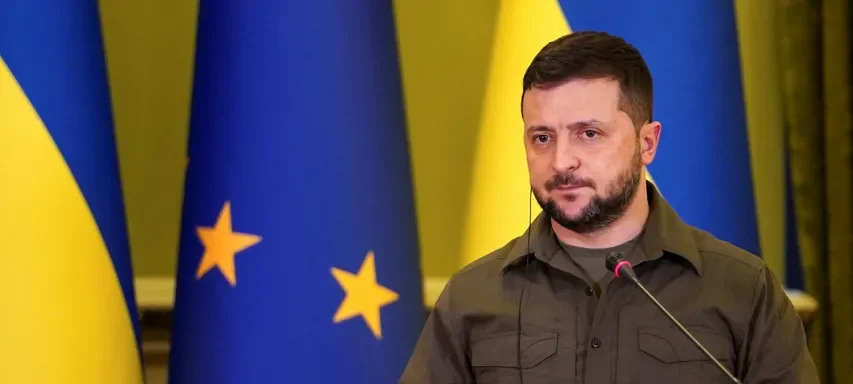Trump Wants Zelenskyy Out in Four Hour Discussion.
Top U.S. and Russian officials recently engaged in their most significant high-level talks since Russia's invasion of Ukraine nearly three years ago.
The four-hour discussion on Tuesday marks a pivotal moment in diplomacy, as President Donald Trump suggested that Ukraine was to blame for the ongoing conflict and that Ukraine should look to elections to resolve the conflict. The tension surrounding the war has resulted in a complicated geopolitical situation, with international repercussions that could reshape future relations between the U.S., Russia, and Ukraine.
Trump's remarks indicated a strong disapproval of Ukraine’s exclusion from the Saudi-hosted talks. He argued that Ukraine should have made concessions earlier to avoid the conflict. "Today I heard, ‘Oh, well, we weren’t invited.’ Well, you’ve been there for three years.
You should have ended it three years ago,” Trump said from his Florida residence. His words have stirred controversy, especially given Ukraine’s ongoing resistance to Russia's occupation and their desire for international support. Trump also made it clear that Ukraine's leaders had missed opportunities to prevent escalation. “You should have never started it. You could have made a deal,” he added.
These comments could have serious consequences for transatlantic relations, particularly with Europe and Ukraine, as well as for the U.S.'s global standing within NATO. Under President Joe Biden, U.S. foreign policy has focused on isolating Russia, condemning its actions in Ukraine, and bolstering support for the post-World War II international order. However, this new phase of diplomacy marks a stark contrast, as efforts are now being made to rebuild diplomatic relations with Russia.
The Meeting: Rebuilding Diplomatic Relations
The U.S. and Russia have not held substantive diplomatic talks since 2022 when then-Secretary of State Antony Blinken and Russian Foreign Minister Sergey Lavrov met in Geneva, an attempt that ultimately failed to prevent the war.
However, the most recent meeting represents a step forward in their diplomatic engagement. In Riyadh, U.S. Secretary of State Marco Rubio and Lavrov reached a preliminary agreement to restore embassy staffing in both Moscow and Washington, which had been reduced due to tit-for-tat expulsions and diplomatic tensions dating back to 2014.
This diplomatic breakdown began in response to Russia's annexation of Crimea in 2014, which was deemed illegal by the international community.
Tensions further escalated after the 2018 poisoning of a Russian spy in the U.K., leading to massive diplomatic expulsions across the globe. Rubio acknowledged that diplomatic relations between the two countries had reached an all-time low after Russia's invasion of Ukraine in 2022, but emphasized that restoring embassy operations is crucial to restarting negotiations for a peaceful resolution to the conflict.
Negotiating Peace: What’s on the Table?
During the talks, both sides agreed to establish high-level working groups to negotiate a potential end to the Ukraine conflict. Although the timeline for these talks is unclear, key issues are expected to include territorial disputes and security guarantees.
Trump’s national security advisor, Mike Waltz, who participated in the meeting, emphasized that these subjects would be central to the negotiations.
On the question of peacekeeping forces, Lavrov firmly rejected the idea of NATO troops being involved, reiterating Russia’s view that Ukraine’s potential membership in NATO posed an existential threat to Russia.
"The deployment of troops from the countries that are NATO members, even if they are deployed under the EU or national flags, will not change anything and will certainly be unacceptable for us," Lavrov stated.
Exclusion of Ukraine and Europe from Talks
Despite Ukraine’s exclusion from these high-level talks, U.S. officials, including Rubio, have insisted that Ukraine and European nations will not be sidelined in peace negotiations.
"No one is being sidelined here," Rubio stated, emphasizing that consultations with Ukraine and European partners would continue. Still, Ukraine's exclusion raised concerns, especially for President Volodymyr Zelenskyy, who chose to postpone a planned trip to Saudi Arabia to avoid the appearance of being linked to the U.S.-Russia negotiations.
His frustration is understandable, especially after Trump’s comments suggesting that Kyiv's actions contributed to the escalation of the war.
The U.S.’s pivot towards direct engagement with Russia is seen by some analysts as potentially tilted in Russia’s favor, with the goal of securing a deal that could result in significant concessions for Ukraine.
“This whole negotiation from the start seems very tilted in Russia’s favor," said Nigel Gould-Davies, a senior fellow at the International Institute for Strategic Studies, “and it’s even a question whether it should be termed a negotiation or in some sense, a series of American capitulations.”
Sanctions, Energy, and Cooperation
As the talks progressed, there was also speculation about the potential lifting of sanctions imposed by the U.S. on Russia. Rubio stressed that any future peace agreement would require concessions from all parties, including the possibility of lifting sanctions, though no specific measures were mentioned.
A notable aspect of the talks was Russia's proposal for joint energy ventures. Kirill Dmitriev, head of the Russian Direct Investment Fund, suggested that Russia and the U.S. could explore joint projects, particularly in the Arctic and other regions.
Rubio did not dismiss these ideas, highlighting that a successful negotiation could open new opportunities for collaboration, particularly on issues like energy, which could benefit both nations and the global community.
A Historical Perspective and Future Outlook
The ongoing diplomatic and military tensions between Russia and Ukraine can be traced back to the disintegration of the Soviet Union in 1991, a historical event that reshaped Eastern Europe and had lasting effects on Russia's relations with the West.
Since then, NATO’s expansion eastward has been a source of contention for Russia, culminating in the 2014 annexation of Crimea, which significantly worsened relations with the West.
The 2022 invasion of Ukraine marked a dramatic escalation in these tensions, leading to the largest European conflict since World War II. While Western nations, particularly the U.S. and EU, have provided military and economic support to Ukraine, Russia has increasingly turned to China and other nations for support.
LATEST: The World's Richest Man - Jeff Bezos (Amazon) Reveals His Biggest Fears in Life
This shifting geopolitical landscape raises questions about the future of global alliances and the potential for new power dynamics.
Looking ahead, the future of U.S.-Russia relations hinges on the outcome of these diplomatic efforts. Should talks succeed in negotiating a resolution to the conflict, it could mark a new chapter in U.S.-Russia cooperation, potentially opening avenues for collaboration in areas like energy, security, and even global health.
However, the path to peace is fraught with challenges, as both sides remain entrenched in their positions, and Ukraine’s role in the negotiations remains a critical factor in determining any long-term solution.


















